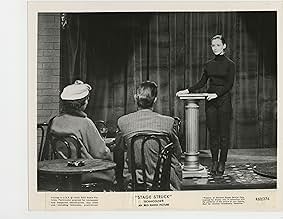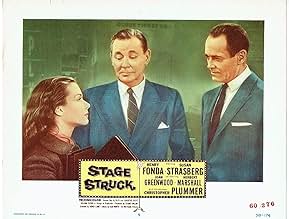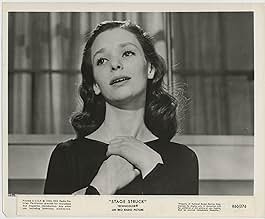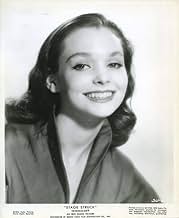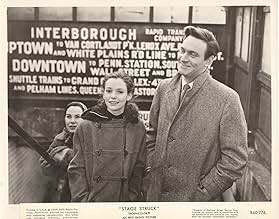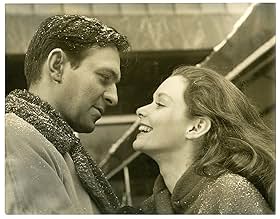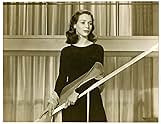Una joven llega a Nueva York decidida a convertirse en una gran estrella teatral, pero descubre que su objetivo puede no ser tan fácil de alcanzar como esperaba.Una joven llega a Nueva York decidida a convertirse en una gran estrella teatral, pero descubre que su objetivo puede no ser tan fácil de alcanzar como esperaba.Una joven llega a Nueva York decidida a convertirse en una gran estrella teatral, pero descubre que su objetivo puede no ser tan fácil de alcanzar como esperaba.
- Dirección
- Guionistas
- Elenco
Pat Harrington Sr.
- Benny
- (as Pat Harrington)
Pat Englund
- Gwen Hall
- (as Patricia Englund)
Merle A. Ashley
- Minor Role
- (sin créditos)
Dario Barri
- Handsome Young Man
- (sin créditos)
Rolly Bester
- Minor Role
- (sin créditos)
Leon Bibb
- Guitar Player
- (sin créditos)
- Dirección
- Guionistas
- Todo el elenco y el equipo
- Producción, taquilla y más en IMDbPro
Opiniones destacadas
Before this film, I had seen Susan Strasberg in two late 1960s AIP low-budget films 'The Trip' and 'Psych-Out' and enjoyed her performances in both so was quite interested in seeing her in the starring role here.
Alas, not only is she not up to the task, but she takes down the film with her. Her performance in the first 30 minutes or so is truly wretched; she's so strained and overwrought that it makes one cringe.
To be fair, from the time she does a reading from 'Romeo & Juliet' (which is quite charming) her performance settles down somewhat but the damage is done. After all, it's in the opening scenes where we're supposed to believe that she wins over Herbert Marshall as a close friend and enchants Plummer and Fonda but her performance kills any chance of that being convincing and the film never recovers.
However, the film is still fairly entertaining. While Fonda seems rather too genial to convince as a Broadway producer he's always entertaining to watch and helps hold the film together. And Joan Greenwood does a nice balancing act as she gives a melodramatic performance yet still lined with depth.
And, as other reviewers have mentioned, director Sidney Lumet puts in some nice touches with the detail he displays in the preparation that goes behind the scenes for opening night.
Also of interest is that it was released as an RKO picture and was probably close to the very last film released by that studio.
Alas, not only is she not up to the task, but she takes down the film with her. Her performance in the first 30 minutes or so is truly wretched; she's so strained and overwrought that it makes one cringe.
To be fair, from the time she does a reading from 'Romeo & Juliet' (which is quite charming) her performance settles down somewhat but the damage is done. After all, it's in the opening scenes where we're supposed to believe that she wins over Herbert Marshall as a close friend and enchants Plummer and Fonda but her performance kills any chance of that being convincing and the film never recovers.
However, the film is still fairly entertaining. While Fonda seems rather too genial to convince as a Broadway producer he's always entertaining to watch and helps hold the film together. And Joan Greenwood does a nice balancing act as she gives a melodramatic performance yet still lined with depth.
And, as other reviewers have mentioned, director Sidney Lumet puts in some nice touches with the detail he displays in the preparation that goes behind the scenes for opening night.
Also of interest is that it was released as an RKO picture and was probably close to the very last film released by that studio.
Susan Strasberg plays Eva Lovelace, an aspiring Broadway actress possessed by some theatric god that directs her to precisely pronounce and deliver each and every word with impeccable timing. She comes to New York by way of Vermont where she performed in numerous summer stock productions and her persistence and personality capture the attention of playwright Joe Sheridan (Peter Cushing) and actor Robert Marley Hedges (Herbert Marshall). Producer Lewis Easton (Henry Fonda) tells her to study the Actor's Studio (would that be Lee Strasberg's school of method acting?) but she doesn't want to dilute her gift by having it altered in an acting school. Strasberg's performance makes and at times almost breaks this picture. It manages to annoy and captivate, often simultaneously. When she delivers Juliet's lines on the stairway of Easton's swank townhome after drinking four or five glasses of Champaigne in front of a party of theater luminaries, it knocks you out. It is as if Eva Lovelace is playing Susan Strasberg. In any event, she (Strasberg) has an unusual beauty and sincerity that come shining through in spite of the theatrics.
Some people are born with talent. Some can acquire it. Others can take all the lessons in the world, and still not grasp that elusive "it". And that's the problem with Susan Strasberg's performance: she clearly understands the nuances and subtleties of acting, but cannot connect that knowledge to the empathy and passion an actor must have to be believable in their role.
When at the party, Eva Lovelace recites the balcony scene from "Romeo & Juliet", and the guests become transfixed, I was never sure if they were staring in awe or horror. Strasberg pauses and reflects on her words perfectly -- at these moments, one could believe she's Juliet watching and waiting for her lover's answers. But when she recites the words -- and a recitation is all it is -- the fire, the passion of Juliet for Romeo is non-existent. She could just as easily have been telling the doorman to call her a cab.
The most interesting aspect of the film was in watching the various methods of acting being presented. Herbert Marshall (who started in silents and early talkies), Henry Fonda (who started in film in the 1930s) and Christopher Plummer (one of the new method actors) are all believable in their roles and mesh seamlessly together. Then there's Strasberg, who is incapable of presenting even a fraction of the range of any of her co-stars. (Frankly, I didn't make the connection between her and her father, and wondered who she knew to have secured the role.) The film is interesting as a curio piece, and Lumet's brilliance in portraying New York's scenery. But as a moving story about the theatre, it can't touch "All About Eve".
When at the party, Eva Lovelace recites the balcony scene from "Romeo & Juliet", and the guests become transfixed, I was never sure if they were staring in awe or horror. Strasberg pauses and reflects on her words perfectly -- at these moments, one could believe she's Juliet watching and waiting for her lover's answers. But when she recites the words -- and a recitation is all it is -- the fire, the passion of Juliet for Romeo is non-existent. She could just as easily have been telling the doorman to call her a cab.
The most interesting aspect of the film was in watching the various methods of acting being presented. Herbert Marshall (who started in silents and early talkies), Henry Fonda (who started in film in the 1930s) and Christopher Plummer (one of the new method actors) are all believable in their roles and mesh seamlessly together. Then there's Strasberg, who is incapable of presenting even a fraction of the range of any of her co-stars. (Frankly, I didn't make the connection between her and her father, and wondered who she knew to have secured the role.) The film is interesting as a curio piece, and Lumet's brilliance in portraying New York's scenery. But as a moving story about the theatre, it can't touch "All About Eve".
Along with "All About Eve" this is one of the finest films dealing with the American theatre. I don't understand why it is a lost film and would urge anybody who enjoys great acting to hunt this film down any way they can. It is also about time it was released on video. Susan Strasberg was clearly one of Hollywood's casualties and it's tragic that the films she made after this were perhaps determined by the mediocre reaction at the time to this film.
Susan Strasburg was method acting guru Lee Strasburg's daughter.The film is peppered with acting luminaries such as Henry Fonda, Christopher Plummer and Herbert Marshall. I was however strongly reminded of a film on a rather similar theme "All about Eve" where again an ambitious young novice actress seeks to advance her career - at the expense of ageing actress played by Bette Davis. The screenplay by Joseph L. Mankiewicz has become immortal as in "Fasten your seatbelts, it's going to be a bumpy night! ".
Not one line of Stage Struck is memorable. My attention was only briefly attracted by something surely unintended around 30 minutes in. Strasburg, Fonda and Herbert Marshal perform part of a Shakespeare play. Henry Fonda was OK but Susan Strasburg quacked and gave no indication of promise even. But Herbert Marshall spoke his lines wonderfully. Marshal, I suddenly realised had wasted and misdirected his talents, not least here.
Interesting Herbert Marshall trivia: During the First World War, Marshall served ... with fellow actors Basil Rathbone, Ronald Colman, Cedric Hardwicke and Claude Rains. (Wikipedia) Coincidentally perhaps the greatest and most distinctive vocal talents in cinema history.
Not one line of Stage Struck is memorable. My attention was only briefly attracted by something surely unintended around 30 minutes in. Strasburg, Fonda and Herbert Marshal perform part of a Shakespeare play. Henry Fonda was OK but Susan Strasburg quacked and gave no indication of promise even. But Herbert Marshall spoke his lines wonderfully. Marshal, I suddenly realised had wasted and misdirected his talents, not least here.
Interesting Herbert Marshall trivia: During the First World War, Marshall served ... with fellow actors Basil Rathbone, Ronald Colman, Cedric Hardwicke and Claude Rains. (Wikipedia) Coincidentally perhaps the greatest and most distinctive vocal talents in cinema history.
¿Sabías que…?
- TriviaEva Lovelace (Susan Strasberg) is told to join the Actors Studio to learn her craft. In real life, Strasberg was the daughter of Lee Strasberg, the acting coach and director of the studio.
- Citas
Lewis Easton: [to Eva] You're a hungry little girl - the theater's offering you a feast.
- ConexionesFeatured in Hollywood the Golden Years: The RKO Story: Howard's Way (1987)
Selecciones populares
Inicia sesión para calificar y agrega a la lista de videos para obtener recomendaciones personalizadas
- How long is Stage Struck?Con tecnología de Alexa
Detalles
- Fecha de lanzamiento
- País de origen
- Idioma
- También se conoce como
- Eines Tages öffnet sich die Tür
- Locaciones de filmación
- Productoras
- Ver más créditos de la compañía en IMDbPro
- Tiempo de ejecución1 hora 35 minutos
- Color
- Relación de aspecto
- 1.37 : 1
Contribuir a esta página
Sugiere una edición o agrega el contenido que falta

Principales brechas de datos
By what name was Stage Struck (1958) officially released in India in English?
Responda

